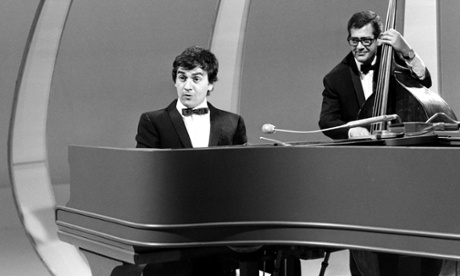
So let’s begin with the oldest on this list, but still one of the best: Flanders and Swann’s An Ill Wind from the mid-1950s, a magnificently logorrheic patter-song on the finale of Mozart’s 4th Horn Concerto, Köchel-rating 495 in E flat major, “which he wrote at the age of about 18 months – marvellous man”, as Michael Flanders says in his introduction. My favourite line? “I know some hearty folk/whose party joke/ pretended to hunt with the Quorn/gone away/gone away/was it one of them took it away…”
And there has to be Dudley Moore. Here he is, with his classic simultaneous impersonation of Benjamin Britten and Peter Pears in “Little Miss Muffet”, with its distinct echoes of the Serenade for Tenor, Horn, and Strings, and Kurt Weill’s Threepenny Opera, both tokens of a time when it was possible to send up contemporary and near contemporary classical music and have the references understood and belly-laughed at. Mind you, if you get the gags or not, these are simply virtuosic comedic and musical performances. As are these: his reversionings of Fauré and Schubert, merciless and brilliant send-ups of the ludicrousness of the lieder recital.
Victor Borge on the Muppet Show. Nothing else, probably, needs saying about this. “Ladies and gentlemen, there seems to be a dog at the piano…” – and off we go. “I offen Bach myself” are among the terrible but miraculous puns, from the man who still holds the record for the longest running show on Broadway.
On the Hour (audio only) A moment from the War Special of Chris Morris’s masterful radiophonic series. Morris rightly hymns the essential role played by war composers in reflecting the horror and pain of conflict. “Here is a repetitative from Michael-Philip-Philip-Philip-Philip Annoyman’s ‘War Goes Bang’” - and Michael Nyman, Philip Glass, and the rest are sent up in one delicious minute.
Glass’s own great moment of pop-culture parody, though, is this, from South Park, when Glass is drafted in as the composer of South Park Elementary’s “The Happy, non-offensive, non-denominational Christmas Play”: “Happy, happy happy! Everybody happy!”, the vocals intone in a lugubrious minor-key Music-in-12-Parts-style drone.
Jazz Club: two stand-out moments of classical and contemporary pomposity-pricking from The Fast Show’s genius Jazz Club series of sketches, first of Nigel Kennedy, and then John Cage’s 4’33’’. Nice.
There has to be room, too, for a bit of Hoffnung-inspired chaos, and it’s this: one of Hoffnung’s commissions, Malcolm Arnold’s A Grand, Grand Overture for orchestra, vacuum cleaners, a floor polisher, and a few gunshots, too. Here it is at the Last Night of the Proms 2009, with contributions from David Attenborough, Goldie, Stephen Hough, Jennifer Pike – and many more.
Rainer Hersch’s classical musical comedy is some of the finest of recent years: here he is with one of his trademark opera translation texts, with soprano Loré Lixenberg, turning Cosi fan Tutte into chicken korma.
Kombat Opera: arguably the most ambitious attempt to revivify opera on television, both deliriously sending up the conventions of opera in five half-hour shows, but just as brilliantly, revelling in and rebelling against the excesses and conventions of TV itself, from The Apprentice (“The Applicants”) to Question Time (“Question Time Out”), and Wife Swap (“Spouse Change”). Richard Thomas’s show did for opera what his Jerry Springer: The Musical did for, well, musicals. For my money, Kombat Opera is even sharper and funnier.
I did begin by saying that Flanders and Swann were the oldest on my list, but I fibbed: here is the unintentional and therefore all the more dangerously hysterical performance that Florence Foster Jenkins recorded in the early 1940s, now available on the ironically titled album, The Glory of the Human Voice. There is something tragic about Foster Jenkins’s delusions of operatic grandeur, but something truly heroic in her battling through to the end of the Queen of the Night’s Aria and her sheer belief that she really could carry it off: “People may say I can’t sing, but no one can ever say I didn’t sing”. But it’s also compellingly, completely, hilarious.







